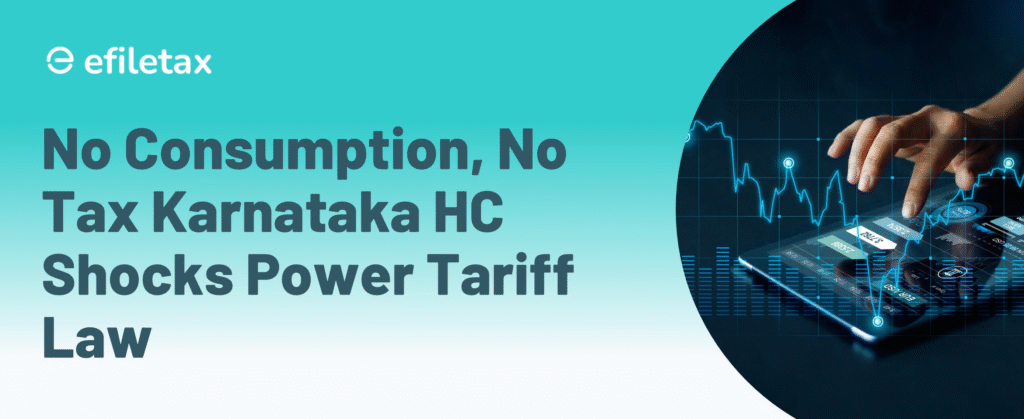
Electricity Supply Without Use Not Taxable Karnataka HC Decision Explained
Is electricity taxed even if you don’t consume it? The Karnataka High Court recently clarified that electricity supply without use cannot be considered a ‘sale’ and hence is not taxable. This ruling protects consumers—especially industries and commercial establishments—from being unfairly taxed on minimum fixed charges, even when no power is drawn.
What Was the Case About?
The case involved JSW Steel Limited, a major industrial consumer of electricity in Karnataka. The company had entered into an agreement with the Karnataka Power Transmission Corporation Ltd (KPTCL), which included minimum demand charges, even if the electricity was not actually consumed.
The State Government had issued a demand for electricity tax on such fixed charges—arguing that it constituted a “sale” of electricity under Section 3(1) of the Karnataka Electricity (Taxation on Consumption) Act, 1959.
Karnataka HC Verdict: Key Highlights
The Karnataka High Court quashed the tax demand, holding:
- No consumption = No sale
Electricity tax under the 1959 Act applies only when electricity is consumed. The Court held that merely having the infrastructure to supply power (without actual use) does not constitute a “sale”. - Fixed charges are contractual, not taxable
Minimum demand charges are not payments for electricity consumed, but rather part of a contractual obligation to ensure supply availability. - Tax law must be interpreted strictly
Since electricity tax is a fiscal statute, it must be interpreted narrowly. The court ruled that the taxing authority cannot stretch the definition of “sale” to cover unutilised power supply.
Legal Basis of the Ruling
Here’s how the Karnataka HC supported its view:
| Legal Provision | Interpretation by Court |
|---|---|
| Section 3(1), Karnataka Electricity Tax Act | Tax applies only to electricity consumed or sold, not to minimum charges |
| Contract Terms | Fixed minimum charges are for ensuring availability, not for actual sale of energy |
| Doctrine of Strict Interpretation | Tax cannot be imposed unless clearly provided in statute |
The judgment reinforces the contractual distinction between ‘availability of supply’ and ‘actual sale or consumption’, which is vital in power purchase agreements.
Expert View: What This Means for Businesses
Tax expert and energy advisor CA Rahul Shetty explains:
“This is a much-needed clarification. Many industries were being unfairly taxed on unused electricity. The judgment helps ensure that taxation follows actual consumption, not hypothetical billing.”
Industries, especially manufacturers and data centers, often face high fixed costs. This ruling protects them from extra tax burdens during non-operational periods (e.g., maintenance shutdowns).
How It Affects You
If you run a business that enters into long-term power agreements with electricity boards, you’re no longer liable to pay electricity tax on unused power, as per this ruling.
Scenarios where this applies:
- Factories closed during maintenance or seasonal demand
- Units temporarily shut due to economic conditions
- Startups or offices in incubation with low electricity draw
However, this ruling is specific to Karnataka and based on that state’s tax law. Other states may have different interpretations unless similar legal action is taken.
Related Case Laws and Precedents
- Supreme Court in State of A.P. v. National Thermal Power Corp (2002): Clarified that electricity becomes ‘goods’ only when it is supplied and consumed.
- JSW Steel Ltd v. State of Karnataka (2025): The case that triggered this judgment.
Government Clarification Pending
As of now, no official circular has been issued by the Karnataka Electricity Department post this High Court verdict. Businesses are advised to consult their legal/tax advisors before stopping any electricity tax payments.
👉 For official updates, keep track of karnataka.gov.in
Summary
Electricity supply without use is not taxable, rules Karnataka High Court. Fixed minimum charges without actual power consumption don’t qualify as a ‘sale’ under the Karnataka Electricity Tax Act. The ruling protects businesses from paying electricity tax on unused power.
FAQs
1. Is electricity tax applicable even if no power is used?
No. As per Karnataka HC, tax applies only if electricity is consumed.
2. What are minimum fixed charges in electricity bills?
These are charges paid to ensure availability of supply, not based on usage.
3. Does this ruling apply across India?
No. This is based on Karnataka state law. Other states may interpret differently.
4. Should I stop paying electricity tax now?
Consult your CA/legal expert before discontinuing any payment. Official instructions may still be awaited.
Final Thoughts
This judgment is a major relief for businesses in Karnataka that were paying electricity tax without using power. It draws a clear line between availability and consumption.
💡 Need help with tax disputes or utility billing audits?
Efiletax can assist you with legal representation, billing review, and compliance support.